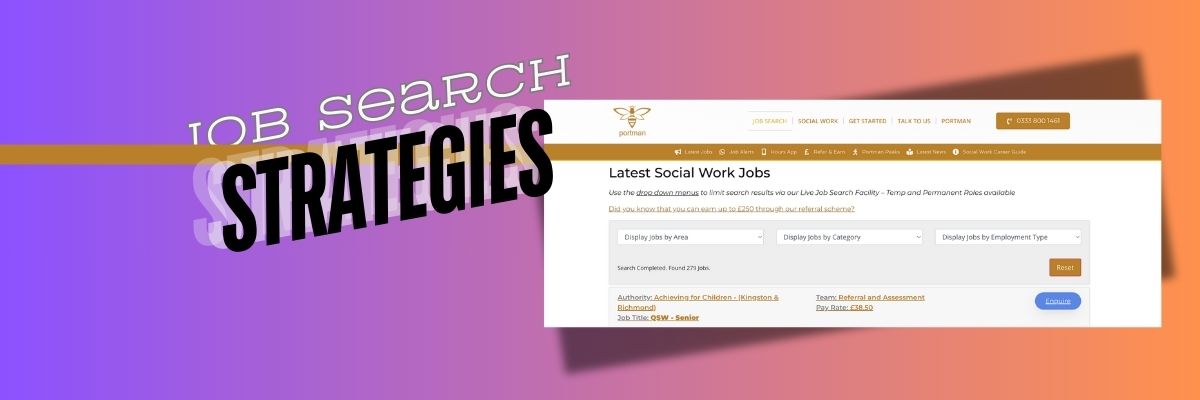Social Work Career Development and Job Search Strategies
Navigating a career in social work can be both rewarding and challenging. Whether you are just starting or looking to advance, having a solid understanding of job search strategies, CV writing, interview preparation, and career progression is crucial. At Portman Recruitment, we specialise in supporting social workers in every stage of their career. This Social Work Career Development and Job Search Strategies guide provides a comprehensive overview of essential strategies to help you excel in your social work career. Be sure to also read our
1. Job Search Techniques
Finding the right role in social work requires more than just searching online job boards. Here are some effective job search techniques tailored to the social work sector:
- Recruitment Agencies:
Partnering with a specialised recruitment agency, such as Portman Recruitment, can provide you with exclusive access to vacancies and personalised career advice. Not only do they do the work for you, but they can often obtain more money for you than if you were to go direct. Check out our latest pay rates for social workers to see for yourself. - Specialised Job Boards:
Use niche job boards that cater specifically to social work and healthcare roles. Websites like Community Care Jobs and Social Work Jobs are excellent resources. - Networking:
Engage with other professionals through social media platforms like LinkedIn, or join social work forums and groups. Networking can lead to opportunities that aren’t advertised. - Continuing Professional Development (CPD):
Attend workshops, seminars, and conferences. This not only enhances your skills but also opens doors to new opportunities through networking. - Volunteering:
Consider volunteer roles to gain experience, particularly if you’re newly qualified. Volunteering can often lead to permanent positions.
2. Crafting the Perfect CV
Your CV is your first opportunity to impress a potential employer. Here’s how to make it stand out:
- Tailor Your CV:
Adapt your CV to each job you apply for, emphasising the skills and experience most relevant to the specific role. Highlight any experience with particular client groups or specialisms in social work. - Clear Structure:
Use a clear and logical format. Begin with a strong personal statement, followed by your key skills, work experience, and education. Ensure your contact details are up-to-date and prominently displayed. - Quantify Your Achievements:
Where possible, include specific achievements, using data to support your successes. For example, “Successfully reduced the number of at-risk children in the local authority by 20% over two years.” - Include Relevant Keywords:
Many employers use software to scan CVs for keywords. Include terms from the job description, such as “safeguarding,” “case management,” or “multi-agency working,” to ensure your CV passes initial screenings. - Keep It Concise:
Your CV should be no more than two pages long. Be concise but thorough, ensuring all relevant information is included without unnecessary detail.
3. Interview Preparation
Securing an interview is an achievement in itself, but preparation is key to success:
- Research the Employer:
Familiarise yourself with the organisation, its values, and the specific services it offers. Understanding the employer’s needs will help you tailor your responses. - Prepare for Competency-Based Questions:
Social work interviews often involve competency-based questions. Use the STAR technique (Situation, Task, Action, Result) to structure your answers, providing concrete examples of your experience. - Practice Common Questions:
Prepare answers to common questions, such as your experience with safeguarding, handling challenging cases, or working within a multidisciplinary team. - Prepare Questions:
Employers will expect you to ask questions at the end of the interview. Prepare thoughtful questions that demonstrate your interest in the role and organisation, such as opportunities for professional development or specific challenges the team is facing. - Dress Appropriately:
While social work is often a field role, it’s important to present yourself professionally in interviews. Opt for smart attire that reflects the seriousness of the position.
4. Career Progression in Social Work
Social work offers numerous opportunities for career progression. Understanding these pathways can help you plan your career effectively:
- Continuing Professional Development (CPD):
Engaging in CPD is essential for career progression. Regularly update your skills and knowledge through courses, workshops, and seminars. Many employers offer support for CPD activities, so take advantage of these opportunities. - Specialisations:
Consider specialising in a specific area, such as child protection, mental health, or substance misuse. Specialising can make you more competitive for senior roles and allow you to become an expert in your field. - Leadership Roles:
With experience, you may want to move into leadership roles, such as team manager or service manager. These positions often require additional qualifications, such as a leadership and management degree or diploma. - Independent Practice:
For experienced social workers, setting up an independent practice can be a lucrative and fulfilling option. This allows you to offer consultancy services, training, or therapeutic services independently. - Further Education:
Pursuing further education, such as a Master’s degree in social work or a related field, can open doors to higher-level positions, including academic roles or policy development positions.
Social Work Career Development and Job Search Strategies
Search and Apply for Social Work here

A career in social work is both demanding and immensely rewarding. By employing effective job search strategies, crafting a compelling CV, preparing thoroughly for interviews, and planning your career progression, you can maximise your potential and find fulfilment in your career. At Portman Recruitment, we are committed to supporting social workers at every stage of their professional journey. Whether you’re seeking your first role or looking to advance to a leadership position, our specialised recruitment services are here to help you succeed.

